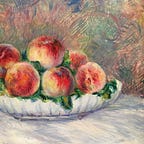The women who wrote
London, November 11 2018
Whispers of the wind, cutting their way through large fields of lavish grass; the air of the English countryside is filled with a void, all the men have left for war. The poppies of Flanders Fields run along the traces left by the leaving soldiers, covering dust, tears and lust for blood. The paths of John McRae, Rupert Brook, Robert Graves and many others, going across England towards France, are rooted in quaint villages. There, figures stand on the roads, without father, brother, husband or son. While they crawl through mud and blood, women are trapped in a bubble untouched by time, which only burst when death-stamped telegrams fly into the towns. At these moments, you can see them in the distance, their bodies breaking and trembling of rage and sorrow. But they get up, take over the deserted lands and jobs. Their hands become the hands of the people, their fingers print on paper the memories of the forgotten of the war. In the fields, in the ammunition factories, women thrive, take their independence. Some of them run to the front lines and military hospitals, wiping red and brown from the tearing cheeks of soldiers, mending their ravaged flesh, supporting the last breaths. But then comes 1918 and its weary glory. Men come pouring back from the battlefield and women are chased back to their home. Their heavy-hearted words, from the dreams of seeing again their loved ones to the pain of not taking the arms, are drowned in the poems of the fighting ones. Men’s verses are seen as the legacy of the Great War, depicting pain, courage, patriotism and death, forming the legend of combat and victory. Did the verses of Vera Brittain, Jessie Pope or Charlotte Mew slip through the spoiled post-war sky? The truth of women’s vision of history should shine through the opacity of memory.
100 years after the armistice was signed, we bring back literature and poetry from the Great War. More than a quarter of poems published during World War One were by women while a fifth were written by soldiers. Many of these shed a different light on the war, as women were occupying different jobs, from field and factory work to medical assistance on the front. As we honor the death of soldiers fallen at combat, lets take a moment to recall this dark period, in which the roles of daughters, sisters, wives and mothers drastically changed, and how this transformation was so truthfully and beautifully translated through poetry and literature.
“There’s the motor girl who drives a heavy van,
There’s the butcher girl who brings your joint of meat,
There’s the girl who calls ‘All fares please!’ like a man,
And the girl who whistles taxi’s up the street.
Beneath each uniform
Beats a heart that’s soft and warm,
Though of canny mother-wit they show no lack;
But a solemn statement this is,
They’ve no time for love and kisses
Till the khaki soldier boys come marching back.”
War Girls, by Jessie Pope
Written in 2018 for the 100th anniversary of the armistice.
Published on the 25th of November 2020, for the International Day for the Elimination of Violence against Women
Aliénor BIERER
